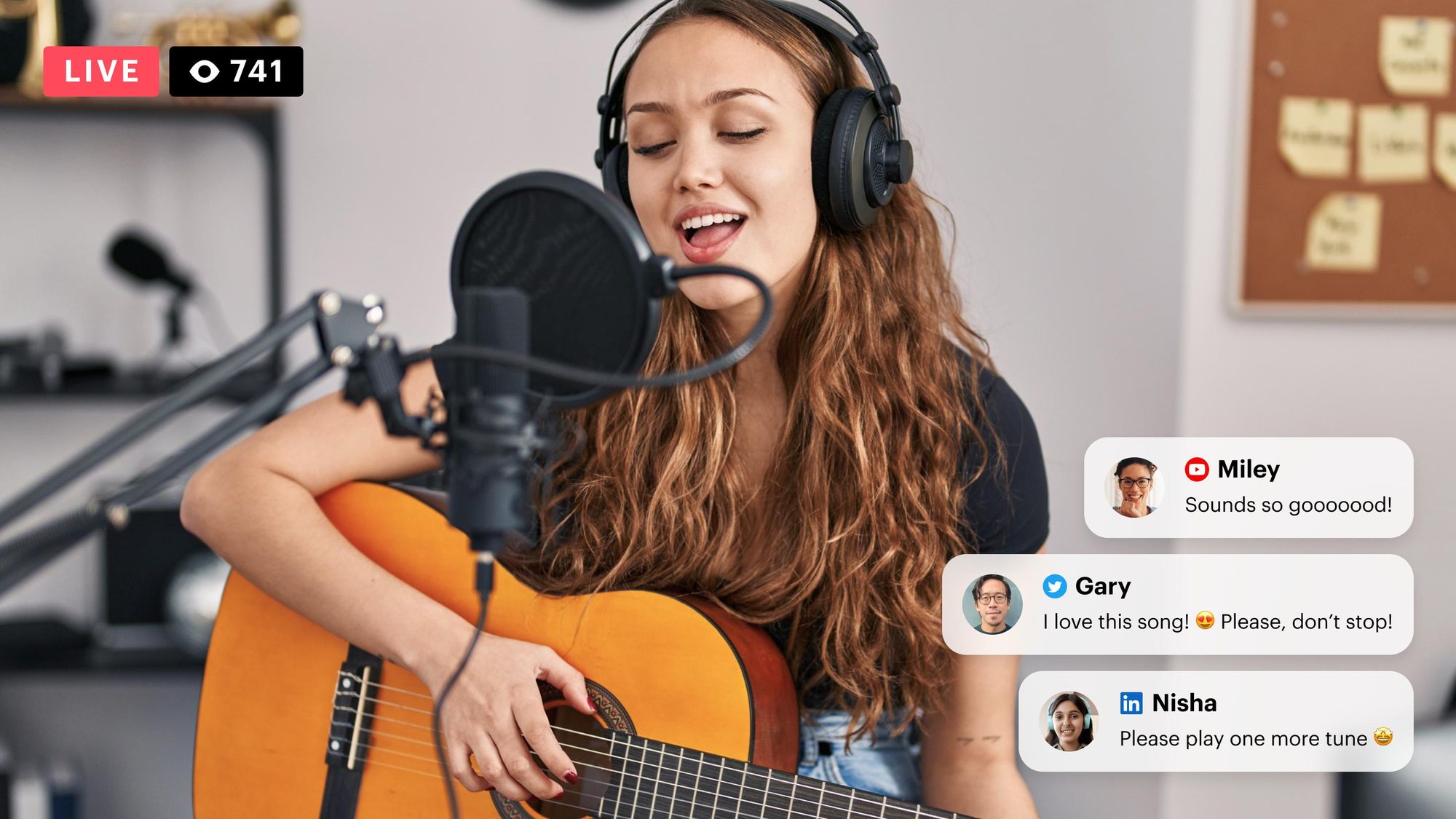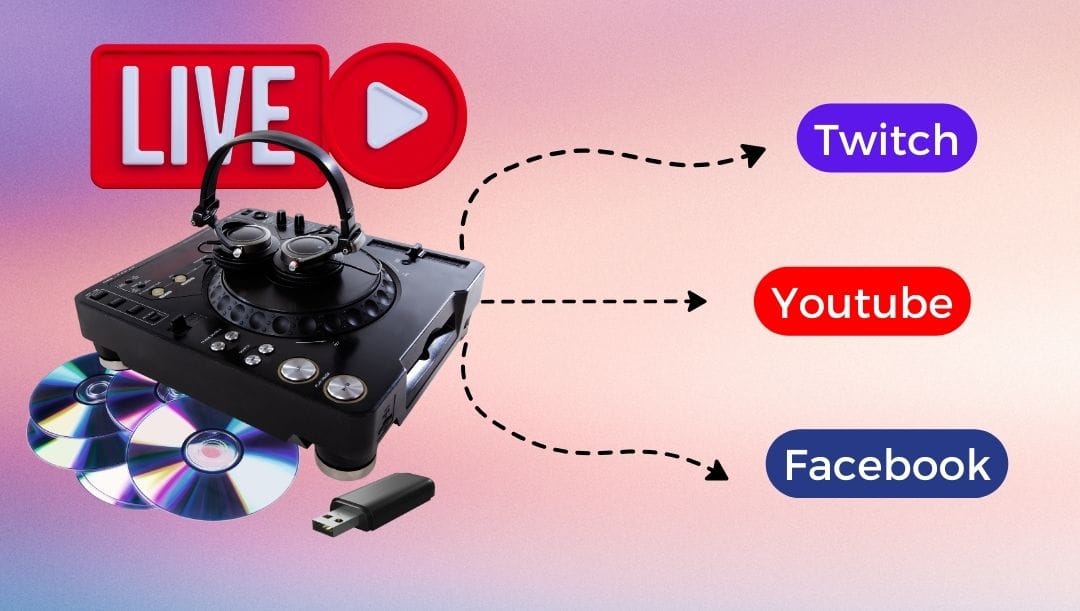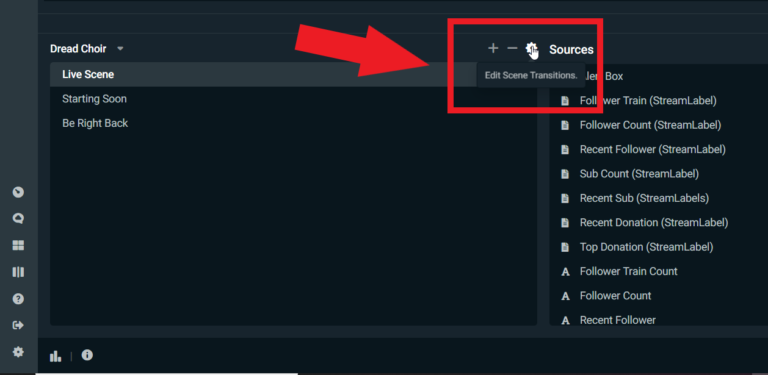Can You Play Music on Livestream: Legal Tips and Best Practices
Yes, you can play music on a livestream, but there are rules. You need to follow copyright laws to avoid any issues.
Livestreaming has become very popular. Many people wonder if they can add music to their streams. Music can make your stream more engaging. It sets the mood and keeps viewers interested. But using music without permission can cause problems. Copyright laws protect music creators.
If you use their music without permission, you might get banned or fined. This blog will explain how you can legally play music on your livestream. You will learn about the types of music you can use and how to get the necessary permissions. This way, you can enjoy music on your stream without any worries.
:max_bytes(150000):strip_icc()/A1-Play-Music-on-Twitch-a722e5de236340c8b885997890fc223e.jpg)
Credit: www.lifewire.com
Introduction To Music On Livestreams
Live streaming is a popular way to share content online. Adding music to your livestream can make it more engaging and enjoyable for your audience. But before you hit the play button, there are important things to consider.
Importance Of Music
Music can set the tone and mood of your livestream. It can make your content more captivating and keep your viewers hooked.
Imagine watching a cooking show without background music—it might seem dull. But with some upbeat tunes, it becomes more lively and fun.
Music also helps in expressing emotions and themes. For instance, calming music can create a relaxing atmosphere for a yoga session.
Legal Implications
Playing music on your livestream isn’t as simple as hitting play. You need to consider copyright laws.
Using copyrighted music without permission can lead to your stream being taken down. Worse, you could face legal action.
So, how do you avoid this? One way is to use royalty-free music. Many websites offer music that you can legally use without worrying about copyright issues.
Another option is to get permission from the music’s creator. This might be more challenging but can be worth it if you want specific tracks.
Have you ever thought about creating your own music? This way, you won’t have to worry about copyright at all. Plus, it adds a personal touch to your livestream.
Adding music to your livestream can enhance the viewer experience, but always keep the legal aspects in mind. What’s your favorite way to add music to your streams?

Credit: restream.io
Copyright Laws And Livestreams
Are you thinking about playing music during your livestreams? Before you hit that play button, it’s crucial to understand copyright laws and how they apply to your content. This knowledge can save you from potential legal troubles and ensure your livestreams remain enjoyable for your audience.
What Is Copyright?
Copyright is a legal protection given to the creators of original works, including music. It grants the creator exclusive rights to use, distribute, and modify their work. This means you can’t use copyrighted music in your livestream without permission.
Imagine you composed a song. You would want others to respect your rights and seek your permission before using your music. The same principle applies when you use music created by others.
Common Copyright Infringements
Playing copyrighted music without permission is the most common infringement. This can lead to your livestream being muted or taken down, and in some cases, legal action. But it’s not just about playing whole songs. Even short clips can cause issues.
Another common mistake is assuming that buying a song gives you the right to use it in a livestream. Purchasing music only gives you the right to listen to it personally, not broadcast it publicly. Public performances, including livestreams, require a separate license.
Have you ever seen a livestream suddenly go silent? That’s likely due to copyright detection. Platforms like YouTube and Twitch use automated systems to detect and mute copyrighted content. This can disrupt your stream and frustrate your audience.
To avoid these pitfalls, consider using royalty-free music or obtaining proper licenses. There are many resources available where you can find music that is safe to use in your streams. This ensures your content stays up and your audience stays engaged.
Have you ever had a livestream interrupted due to copyright issues? How did you handle it? Share your experiences and tips in the comments below!
Licensing Music For Livestreams
Licensing music for livestreams is essential. It ensures legal compliance and supports artists. Live streaming platforms take copyright seriously. Without proper licenses, your stream could face penalties.
Types Of Licenses
Understanding the types of licenses is crucial. There are two main types: public performance and synchronization licenses.
Public performance licenses allow you to play music during your stream. They cover the rights of the songwriter and publisher.
Synchronization licenses are needed for pre-recorded videos. They let you use music with visual content.
How To Obtain Licenses
Obtaining licenses can seem complex. But it is manageable. First, identify the right licensing agency. Organizations like ASCAP, BMI, and SESAC offer public performance licenses. They represent songwriters and publishers.
Next, contact the agency. Provide details about your livestream. This includes the platform and audience size. The agency will guide you through the process.
For synchronization licenses, reach out to the music publisher directly. They will discuss usage terms and fees.
Using licensed music ensures your livestream is legal. It also supports the music industry.
Public Domain And Royalty-free Music
Streaming music during a livestream can be tricky. Using public domain and royalty-free music ensures you avoid copyright issues. Choose wisely to keep your content legal and engaging.
When live streaming, choosing the right music can enhance your content and keep viewers engaged. However, it’s crucial to understand the legalities of using music. Public Domain and Royalty-Free Music are your best options to avoid copyright issues. Here’s how you can make the most of them.What Is Public Domain?
Public Domain refers to creative works not protected by copyright law. Anyone can use these works without permission. This includes music created before 1923 or works whose copyright has expired. You can find classical pieces like Beethoven or Mozart in the public domain. Use them freely in your live streams. However, make sure the recordings themselves are also free of copyright.Sources For Royalty-free Music
Royalty-Free Music is another great option. You pay once and use the music as much as you like. No ongoing fees or additional permissions needed. Websites like Free Music Archive and Incompetech offer a wide range of royalty-free tracks. You can also explore YouTube’s Audio Library for free options. Many creators swear by PremiumBeat or AudioJungle for high-quality music. These platforms offer diverse genres to match any mood or theme. Why not experiment with different tracks? See how your audience reacts. You might discover new music that resonates with your viewers. Choosing the right music can set the tone for your live stream. Make sure you understand the rules and use available resources wisely. Have you considered how music can elevate your content?Fair Use Doctrine
The Fair Use Doctrine allows limited use of copyrighted material without permission. This legal doctrine helps balance the rights of copyright owners and the public. Livestreamers can benefit from understanding this law. Knowing the limits of fair use can save you from legal trouble.
Understanding Fair Use
Fair use evaluates the purpose, nature, amount, and effect of the use. Educational purposes often fall under fair use. Transformative use, which adds new meaning, may also qualify. The amount used should be reasonable and not the “heart” of the work. Lastly, the use should not harm the market value of the original work.
Examples In Livestreams
Consider a livestreamer who plays a short clip of a song. They discuss its impact on culture. This may qualify as fair use. Another example involves parody. Transformative use, like creating a comedic version of a song, might be allowed. Livestreamers can also use brief excerpts for educational commentary. Always remember, fair use is not a guarantee. Evaluate each use case carefully.

Credit: blog.livereacting.com
Using Music Streaming Services
Live streaming music can enhance your online presence. Ensure you have the right licenses to play music legally. This avoids copyright issues.
When considering adding music to your livestream, using music streaming services can be a game-changer. These platforms provide a vast library of songs, making it easy to find the perfect track for any moment. However, there are some important factors to consider to ensure a smooth and legal experience.Platforms To Consider
Several music streaming services stand out for livestreaming. Spotify is a popular choice due to its extensive library and user-friendly interface. Apple Music offers high-quality audio and exclusive releases. Amazon Music is another option, often bundled with Prime memberships, providing an affordable choice. SoundCloud is great for discovering up-and-coming artists and unique tracks.Pros And Cons
Using music streaming services for your livestream has its advantages and disadvantages. Pros: – Wide Selection: Access millions of songs across various genres. – High Quality: Enjoy professional-grade audio. – Convenience: Easily create and manage playlists. Cons: – Licensing Issues: Not all tracks are licensed for public use. – Subscription Costs: Premium features often require a paid subscription. – Platform Restrictions: Some services have strict rules about streaming their content. Streaming music can enhance your livestream. However, it’s crucial to understand the rules and choose the right platform. Have you ever faced challenges with using music in your streams? How did you overcome them?Best Practices For Avoiding Legal Issues
Playing music on a livestream can be tricky. You want to enhance your content, but legal issues can arise. Follow best practices to avoid trouble. This guide will help you understand the do’s and don’ts, and steps to protect your channel.
Do’s And Don’ts
Do use royalty-free music. Many websites offer music without copyright issues. Do check the licenses of any music you use. Always ensure the music is free for commercial use. Don’t use copyrighted music without permission. This can lead to your stream being taken down. Don’t assume popular songs are safe to use. Most popular songs have strict copyright rules.
Steps To Protect Your Channel
First, always read the terms and conditions of music libraries. Make sure they allow use for livestreams. Second, keep records of the permissions you have. If there is a dispute, this will help you. Third, consider subscribing to a music service that covers livestreams. These services handle the legal work for you. Fourth, use YouTube’s audio library or Twitch’s Soundtrack tool. These options are safe and easy to use.
Protecting your channel is about being cautious. Don’t take risks with copyrighted music. Always verify your sources and permissions. By following these steps, you can enjoy music on your livestream without legal issues.
Case Studies
Many streamers wonder if they can play music on their live streams. Different platforms have various rules about this. Understanding these rules can help avoid legal issues.
### Case Studies When it comes to playing music on livestreams, some streamers have had successful experiences while others faced legal consequences. Let’s explore some real-life case studies to understand the nuances involved. ###Successful Livestreams
Many livestreamers have successfully integrated music into their streams without facing legal issues. Take the example of a popular gaming streamer, Alex. He used royalty-free music libraries to enhance his streams. Alex also made sure to credit the music creators, adding a sense of community and appreciation. His viewers loved the added ambiance, and his follower count increased significantly. Another example is Emma, a lifestyle vlogger. She secured permission from indie artists to play their tracks during her streams. This not only kept her content fresh but also supported up-and-coming musicians. ###Legal Consequences Faced
However, not everyone has had such positive experiences. John, a fitness trainer, faced severe consequences for playing popular tracks during his workout livestreams. Despite his good intentions, he received multiple copyright strikes. John’s account was temporarily suspended, and he had to navigate a complex legal process to get his account reinstated. He regretted not researching copyright laws beforehand. Another case involves Sarah, a cooking show host. She played background music from her favorite bands. Unfortunately, this led to her videos being muted and eventually removed. Sarah had to issue public apologies and re-upload her content without the copyrighted music. These case studies highlight the importance of understanding and respecting copyright laws. As a streamer, you must make informed decisions about the music you use to avoid legal pitfalls. Have you ever faced similar challenges with your livestreams? How did you handle it? Sharing your experiences can help others navigate this tricky landscape.Frequently Asked Questions
Can I Play Music On A Livestream?
Yes, you can play music on a livestream, but ensure you have the proper rights or licenses to avoid copyright issues.
Are Streamers Allowed To Play Music?
Streamers need proper licenses to play music. Unauthorized use can lead to DMCA takedowns. Use royalty-free or licensed music.
Is It Okay To Play Music While Streaming On Twitch?
Playing music on Twitch is risky due to copyright issues. Use Twitch’s Soundtrack or royalty-free music.
How Do I Avoid Copyright On Live Streams?
Avoid copyrighted material. Use royalty-free music and images. Obtain necessary licenses. Credit original creators. Monitor content diligently.
Conclusion
Playing music on a livestream can be tricky. Always check copyright rules. Use royalty-free music to stay safe. Consider platforms with built-in music libraries. This ensures a smooth streaming experience. Avoid legal issues by following guidelines. Your audience will appreciate the effort.
Happy streaming!




